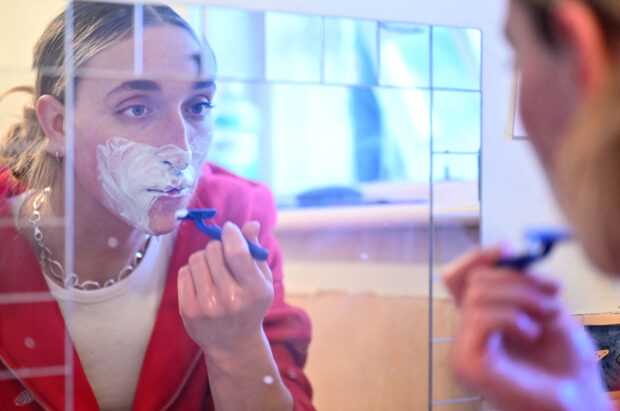‘Suddenly I felt like myself’: the long process to change gender in UK

Anna Drew shaves in the morning while getting ready for work at home in Hertfordshire, north of London on March 30, 2023. The issue of transgender identity is a divisive one that has increasingly stirred heated debates in the UK, as well as the United States. Anna Drew, a 22-year-old British woman, just wants better understanding, six years after she began her gender transition. AFP
LONDON — Transgender identity has become part of the ideological “culture wars”, but Anna Drew, a 22-year-old British woman, just wants to be better understood, six years after she began her gender transition.
By publicly sharing how she came out, the hormones she takes and the verbal and physical assaults she has had to face, she hopes it will help others on a similar journey.
According to a survey published last January by the Office for National Statistics, about one percent of 16-24-year-olds in England and Wales report a different gender from the one assigned at birth.
Anna, who lives with her parents north of London and has a twin brother she describes as “a real boy,” is one such individual.
“My name when I born was Andrew,” Anna told AFP.
Article continues after this advertisement“My new name is Anna Drew. I’m not ashamed of who I was, It’s part of my story. I know a lot of trans people who say, ‘that person is dead now, that person doesn’t exist anymore’.
Article continues after this advertisement“Deep inside, Andrew is still there, but it’s just not me.”
During the day, Anna makes wigs for a hairdresser, after initially working as a colorist.
At night, twice a week, she performs as a dancer in trans clubs.
“There are normal people in the world down there that just happen to be transgender,” she says.
“It can be your favorite teacher, your hairdresser, the guy who works at the corner shop, anyone having normal life.”
Wig and make-up
The issue of transgender identity has increasingly stirred heated debate in the UK, as well as the United States, pitting conservative right-wingers against more socially liberal progressives.
Scotland, which has a separate legal system from England and Wales, in 2022 proposed making it easier and faster for people to officially change their gender, dropping the requirement for a medical diagnosis of gender dysphoria.
But the draft legislation was blocked by the UK government in London, in a rare use of its veto powers against the devolved administration.
The Scottish Appeal Court ruled London’s move lawful in December.
Anna, who attended a conservative Jewish school, was 14 when she first came out as homosexual to her parents, who work in advertising.
At parties, she would do her makeup and dress like a drag queen. Back home, she removed her wig and makeup.
“When I looked in the mirror, I was like ‘oh no, I don’t see myself now’,” she said.
At 16, she came out as trans, choosing the name Anna, first with friends and then with her parents, who, over time, accepted her transition.
“Suddenly, I felt like myself,” she said.
However, no family member has come to see Anna dance at the clubs where she works.
With long hair, high heels, and an extra-short tight dress, she dances for an audience almost exclusively of men in their forties who are not typically accustomed to LGBT+ nights.
‘Second puberty’
During the day, Anna wears jeans, a crop top and a jacket to blend into the crowd.
But she said she hears “transphobic” comments “almost every day”. She tries to respond with a smile.
One night last year a man snatched her wig, hit her in the face, and spat on her.
“People who say something transphobic — they’re never going to ruin my day,” she says.
“I had a black eye. My ego was bruised as well. I disturb them just because I exist.”
Anna started taking hormones three years ago, through a gel she applies to her body and likens it to a “second puberty at 22”.
“My hips are wider, my face changed a little bit, with softer features. It redistributes the fat in your body,” she said.
“Slowly, I’m becoming the woman I want to be.”
Anna, who is trying to save up for breast implants, has her hormone treatment prescribed and funded by a private charity after receiving no help on the state-funded National Health Service.
“I was extremely lucky,” she said. “If this charity never responded to me, I would have still not even started hormones by now.”
The administration is a different story.
“It’s such a long process… . I’m already socially transitioned. Everyone refers to me as she. I guess sometimes I forget the importance of the legal side of it.”
Her passport still bears her old name. So, when she travels, she is Andrew again, just for the duration of the flight.
RELATED STORIES